

HU Tao, born in 1986, is a serial entrepreneur in the internet industry and an avid mountaineer. He was part of the founding team of Beijing Didi Chuxing Technology and a core member of Aiwujiwu, which was once the fastest-growing unicorn startup in the world.
In recent years, he has turned his attention to advancing life sciences and biotechnology, joining Darwin Biotechnology to help tackle complex medical challenges such as Alzheimer’s disease, ALS, and stroke.
HU Tao is also a brand ambassador for Huawei’s Mate50 series and Ziroom. As a board member of the China Adventure Association, he has made notable contributions to promoting adventure tourism and cultural exchange between China and Nepal.
As of now, he has summited Mount Everest, Lhotse, Annapurna, and Makalu, and continues his quest to complete all 14 of the world’s peaks above 8000 metres.












Feng Yuan (Yangee) hails from the historic city of Xi'an, China, and currently serves as the Chinese Communications Officer at ICIMOD. In this capacity, she is instrumental in cultivating meaningful partnerships with Chinese institutions, curating knowledge products, organizing impactful outreach events, and developing communication strategies tailored to Chinese audiences.
Yangee works in close collaboration with ICIMOD’s Head of Communications, the partnership and networking team, the media department, the China focal point, and experts across ICIMOD’s diverse Action Areas. Her expertise has been pivotal in advancing the cooperation between China and ICIMOD on international platforms and global initiatives, such as SOS, IYGP, and COP etc.
A dedicated nature enthusiast with profound ties to the mountaineering community, Yangee has worked extensively with climbers from China, Nepal, and beyond. She is a Record Collector to the Himalayan Database, the definitive record of all expeditions in the Nepal Himalaya.
Yangee’s passion for mountain narratives and Sherpa culture has fostered a deep connection with the Himalayas. She has trekked through the Langtang and Annapurna regions, and spent the autumn climbing season working as a manager at Manaslu Base Camp in 2017. Additionally, she has summited a 6,000-meter peak in China.
Read her works in Chinese:
Glacial dialogues in China: Uniting minds on climate change
Strengthening ICIMOD-China cooperation for a shared future for mountains and people
Advancing environmental protection and sustainable development in the Hindu Kush Himalaya
Strengthening our collaboration with China

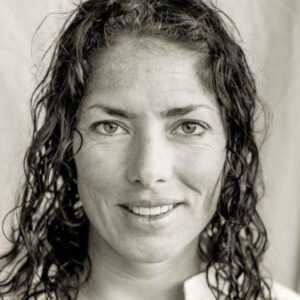
Dr Katie Conlon is the Director, and Founder of the Ecoseva Institute, a non-profit organisation dedicated to advancing environmental service and sustainability through community-focused initiatives. She has nearly 20 years of experience in research, leadership, and program management. A National Geographic explorer, she led pivotal research on plastic reduction in the Himalayas, building awareness and driving environmental change across India, and Nepal. Her academic credentials include a PhD in Urban Studies and Sustainability and a Masters in International Peace Studies, complemented by her role as a Research Affiliate at Portland State University, Portland, United States; a Royal Geographical Society fellow, and a Fulbright Specialist.
Katie specialises in building collaborative partnerships, translating complex scientific ideas into accessible narratives, and fostering environmental awareness and engagement among diverse audiences. She is particularly interested in initiatives that address pollution, ecological restoration, and socio-economic justice for vulnerable populations, with a vision to restore socio-ecological balance in the face of global environmental change.
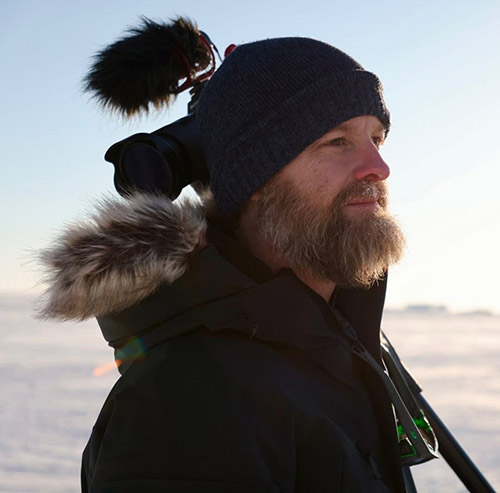
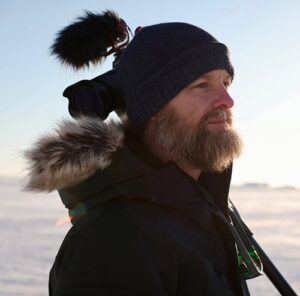
A seasoned Argentine filmmaker and adventurer, Miguel is passionate about polar regions, mountains and wildlife. He has climbed some of the tallest mountains in the world including Mount Aconcagua, Chimborazo, Kilimanjaro x2, Mount Kenya, Izztacíhuatl, and participated in five expeditions in the Antarctica and three in the Arctic.
Miguel has produced films in over 60 countries over the past decade. Some of his unforgettable experiences include: travelling to war-torn Libya with a mission to save lions at the abandoned Tripoli Zoo; being first to film a previously undiscovered Emperor penguin colony in Antarctica's remote Marie Byrd Land; and flying over active volcanoes with endangered gorillas in North Kivu, Democratic Republic of the Congo.
Miguel served as the United Nations Environment Programme’s (UNEP)Head of Multimedia (2016-2019).
Miguel's work has also won awards in international film festivals. His movie about an endangered Amur tigress in Far East Russia was a finalist at Wildscreen Film Festival in Bristol, UK (Panda Awards 2014). His work has been showcased by National Geographic, GoPro, Discovery, and CNN among others. He also recently produced two ground-breaking VR360 documentaries on snow leopards in Kyrgyzstan and mountain gorillas in Uganda.
Miguel holds a Postgraduate Degree in Natural History Filmmaking and Communication from the University of Otago, New Zealand.
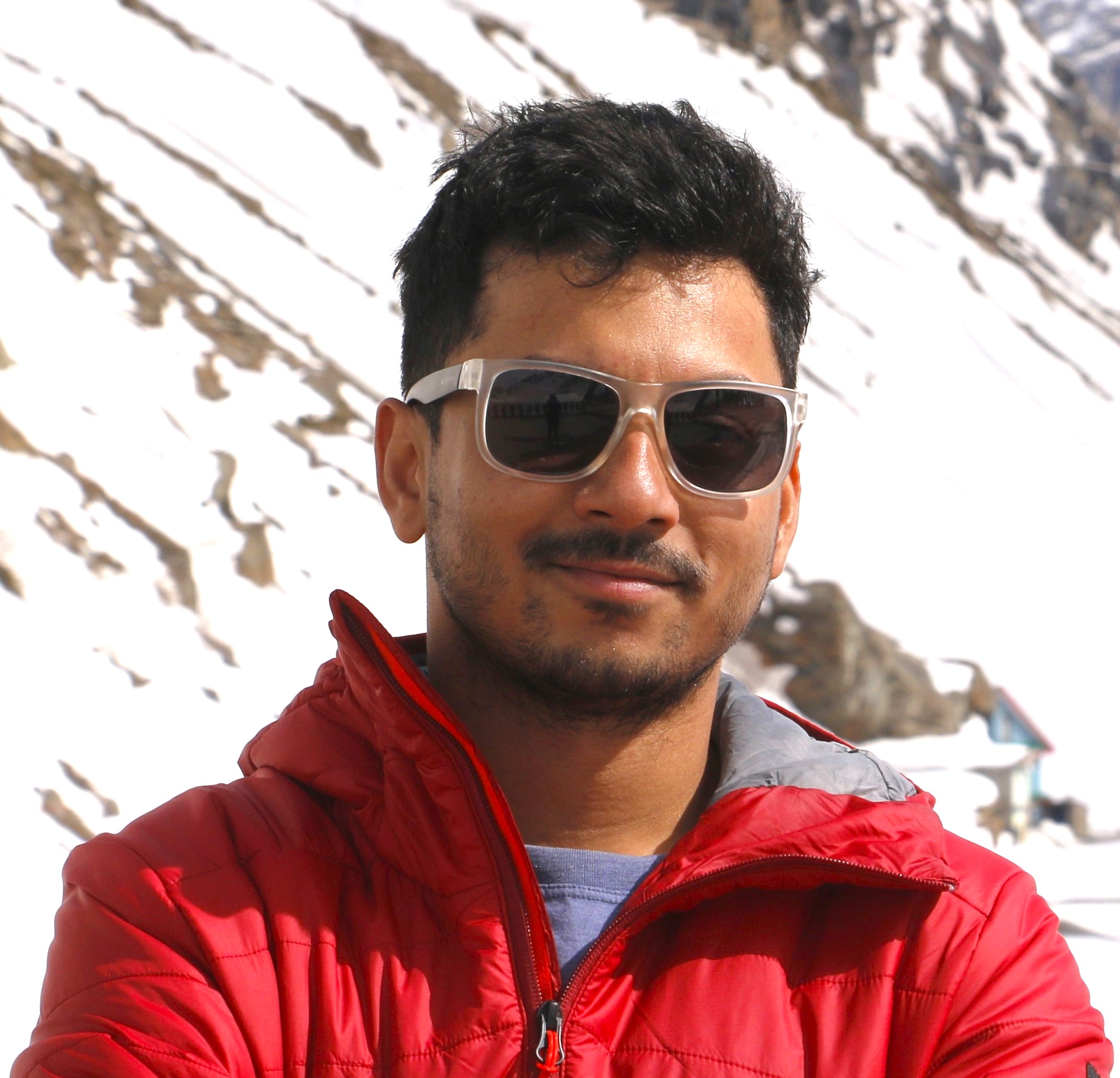
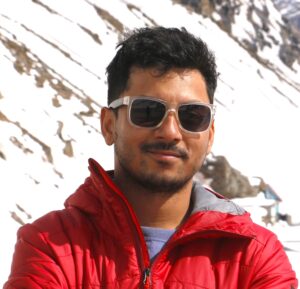
Tirthankar Ghosh is a PhD student at the IITB-Monash Joint PhD Program and is part of the Department of Civil Engineering, IIT Bombay, and the School of Earth, Atmosphere, and Environment, Monash University. His research focuses on how glaciers in the Ladakh region will evolve with climate change, using satellite datasets, climate data, and numerical modelling techniques, as well as fieldwork in the high-altitude terrains of the Himalayas. He is working under the guidance of Professor Raaj Ramsankaran (IITB), Professor Andrew Mackintosh, and Dr Felicity McCormack (Monash University). His research will help advance the understanding of glacier-climate interaction and future water availability in the region. He is a gold medallist with a master's degree in geoinformatics, where he previously worked on mountain permafrost for his master's thesis, which led to the publication of several significant research papers. Outside academia, Tirthankar is a hobbyist photographer, capturing the raw beauty of nature through his lens. His love for the Himalayas extends to hiking, where he finds inspiration and solace in the majestic landscape. He is also a certified mountaineer, connecting his passion for research and exploring the mountains.


Annie Dare joined the International Centre for Integrated Mountain Development (ICIMOD) as Head of Communications in April 2023. She led the launch of ICIMOD’s global advocacy campaign #SaveOurSnow in May 2023 and the publication of ICIMOD’s Water, Ice, Society and Ecosystems in the Hindu Kush Himalaya report in June 2023. She represented ICIMOD at the UN Framework Convention on Climate Change Conference in Dubai in November, including presenting during a segment on Cryosphere, Mountains, and Adaptation on Earth Information Day.
Annie was previously based in the UK, working as Communications Consultant to Disasters Emergency Committee (DEC), the fundraising secretariat for the UK’s 15 largest humanitarian organizations, whose member charities include the Red Cross, International Rescue Committee, Oxfam, Save the Children and Islamic Relief. At DEC she worked on the Afghanistan Crisis Appeal (2021), the Pakistan Floods Appeal (2022) as well as the Ukraine Humanitarian Crisis Appeal (2022). The latter set a new world record for the most money raised by an online campaign in one week and raised £420M overall.
Annie has also advised City Bridge Foundation, the City of London Corporation’s grant-giving arm, worked with global youth climate network and Billon Acts awardee Re-Earth Initiative to campaign for a step-change in the governance, and speed and scale of city-led carbon removal, and in 2022-23 was an organiser and spokesperson for UK nature access group Right to Roam’s campaign to restore the right to wild-camp in the UK national park, Dartmoor. This ‘Stars Are For Everyone’ campaign in January 2023 sparked the largest access protest in the UK in a century, secured widespread national and global media coverage, and led to a decision to overturn the ban on wild-camping in the UK Royal Courts of Justice in the summer of 2023.
From 2009-2012 Annie served as Special Advisor to the UK tech entrepreneur, philanthropist and member of the House of Lords, Martha Lane Fox, when Lane Fox spearheaded a revolution in digital processes and services within the UK Government. Annie has continued to champion better use of digital tools and approaches for social and environmental change, notably through the prestigious Founders Forum network, through work for the UK tech-for-good funder Nominet Trust and via the Centre for the Acceleration of Social Technology, whose Catalyst network she helped form, resource and launch.
She previously worked as a print journalist, including as a sub-editor for the Financial Times Weekend Magazine, and as a copywriter – for clients including the London office of elite advertising agency Wieden+Kennedy.
Throughout her career, she has set out to build the networks, resources and opportunities of those furthest from power, notably through the foundation of the global participatory development organisation PhotoVoice, Lane Fox’s Manifesto for a Networked Nation programme of work and UK prison leavers charity, Switchback – whose “Flip the Script” campaign she co-developed. The campaign’s Time & Again podcast won gold at the UK Podcast Awards in 2023.
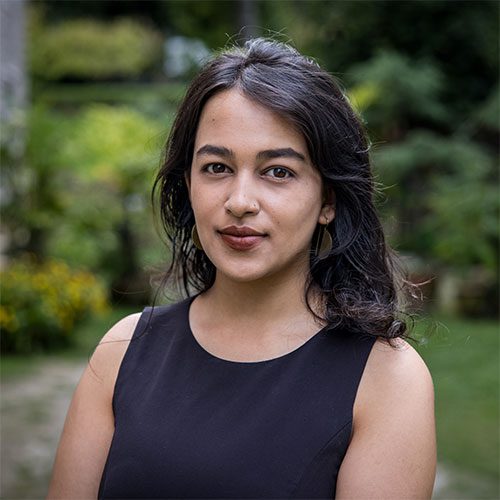
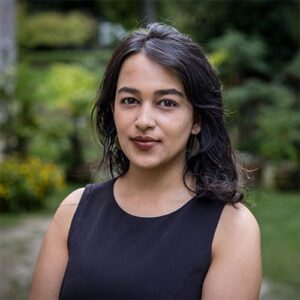
Anshu Pandey is a Senior Media Associate at ICIMOD, a position she has held since November 2023. Previously, she served as a Media Associate at ICIMOD from August 2021 and was part of the organisation’s delegation to COP27 in Sharm El Sheikh, Egypt. She has been a part of the SaveOurSnow Campaign since its inception, supporting in communication and outreach. With nine years of experience in media and digital marketing, Anshu brings a diverse skill set to her role.
Before joining ICIMOD, Anshu was an Associate Project Manager at Glassdust Digital, crafting marketing campaigns for various brands and organisations like USAID’s Nari Paila, WorldLink, and Samsung. Additionally, she served as a Language and Arts Instructor with the US Embassy’s Book Bus programme, facilitating workshops on equality, digital literacy, and retelling history for students from marginalised communities across Nepal.
Anshu’s freelance writing experience includes developing scripts for an educational comic against child marriage – targeted at teens and young adults – in collaboration with JCYCN. With her educational background in environmental science and extensive experience in digital communication, Anshu is passionate about using science communication to bridge the gap between science and the public.


Kyle is a multimedia environmental storyteller and conservationist focusing on the Greater Himalaya and Tibetan Plateau. He is a member of the International League of Conservation Photographers and Explorers Club, recipient of a Peking University Outstanding Alumni Award, and two-time winner of the China National Geography’s China Wildlife Video Competition. Fluent in Mandarin, his conservation work reaches an online audience of over 250,000 in China.
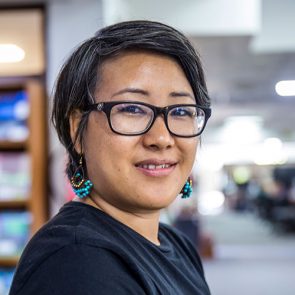

Chimi Seldon is a Communications Officer at ICIMOD since 2014. She is a seasoned science and development communication professional with over 18 years of experience in the non-profit sector in South Asia.
Chimi specializes in strategic communication and targeted outreach, with a strong track record of collaborating with government bodies to influence policy. Her core skills include outreach and liaising, writing and information packaging, and clearly and concisely communicating complex information.
She played a pivotal role in the establishment of the Hindu Kush Himalaya CryoHub and continues to contribute significantly to its positioning as a major science network in the region.
Chimi holds bachelor’s degree in Journalism from Monash University, Australia.


Sangya Mishra is an intern at ICIMOD within the Cryosphere Intervention under Action Area A: Managing Cryosphere and Water Risks. She holds a BSc in Hydrology and Meteorology and is currently a graduate student in the same field at Tribhuvan University. Her research at ICIMOD focuses on using Remote Sensing to assess snow cover dynamics over Nepal, within the Hindu Kush Himalaya. Through extensive field expeditions to mountain glaciers such as Changri Nup and Rikha Samba, she has gained valuable insights into the changes affecting the glaciers and their impacts on local communities and ecosystems. She is committed to protecting the planet’s frozen mountain zones, recognizing them as key sources of freshwater for a quarter of humanity and habitats for resilient lifeforms. She believes that understanding and addressing the effects of climate change on these mountains is critical to preserving their beauty and ensuring a sustainable future.
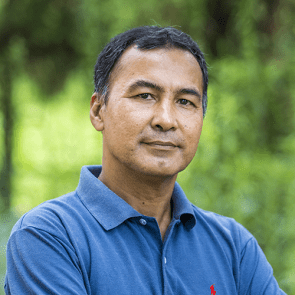

Sharad Prasad Joshi is a Cryosphere Analyst in the Action Area, Managing Cryosphere and Water Risks under Cryosphere intervention. He is Nepal’s national correspondent for the World Glacier Monitoring Service (WGMS) and has been with ICIMOD since 2010 in various roles and responsibilities. Sharad has over thirty years of experience in cryosphere research and capacity building in Nepal, Bhutan, Afghanistan, and Pakistan. Throughout his career, he has been involved in glacial lake monitoring, glacial lake outburst flood (GLOF) observations, and in the implementation of benchmark glacier monitoring. Sharad has led several research expeditions to gather crucial information on the Himalaya in Nepal. He has also conducted capacity-building training on monitoring for regional professionals to expand monitoring activities in the HKH region.
Before joining ICIMOD, he was with the Water and Energy Commission Secretariat of the Government of Nepal. His areas of expertise include glacier monitoring, glacial lakes, GLOFs, impact assessment, GIS, and RS. His work has been published in working reports and peer-reviewed journals, and as book chapters. Sharad holds a diploma in cartography, GIS, and mapping from ITC, the Netherlands, and a degree in business management from Nepal.
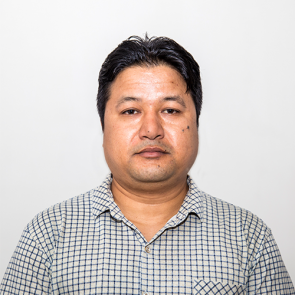

Sudan Bikash Maharjan is a geologist and has been working as a Remote Sensing Analyst specialising in cryosphere and geohazard research at ICIMOD since 2009. In this role, he is leading the remote sensing-based glacier and glacial lake mapping and monitoring in the HKH and is also involved in the analysis and investigation of various geohazards in the region such as GLOFs and landslide/landslide dam. Sudan has also expertise in hydrogeology, river dynamics, morphology, and geomorphology. He has authored/co-authored over forty scientific research papers and reports related to glaciers, glacial lakes and their associated hazards, landslides, and hydrogeology.
Prior to joining ICIMOD, he was a Research Assistant with WaterAid Nepal where he was involved in monitoring, modelling, designing, and analysing data on shallow groundwater recharge through rainwater harvesting in Patan, Nepal. He has also worked as a consultant and hydrogeologist in various private research companies in the area of groundwater feasibility study and groundwater exploration in Nepal.
Sudan holds a master’s degree in geology from Tribhuvan University, Nepal.
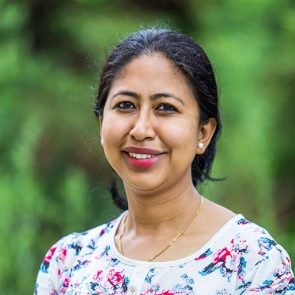

My role involves remote sensing based monitoring and assessment of the cryosphere (glaciers and glacial lakes) and cryosphere-related hazards such as glacial lake outburst floods (GLOFs) in the HKH. I supervise and guide a group of young professionals (within and outside Nepal) on mapping glaciers and glacial lakes applying earth observation (EO) and geospatial tools and techniques, and quantifying these data to analyze the glacial environment in the context of changing climate in the HKH.
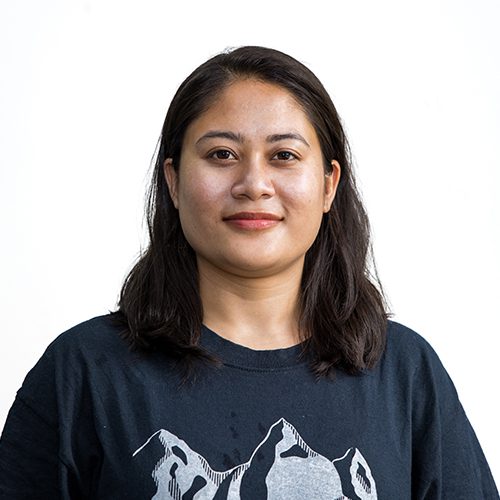

Sunwi Maskey is a Cryosphere Research Associate at ICIMOD, specialising in glaciology within the Cryosphere Intervention under Action Area A: Managing Cryosphere and Water Risks. She has held this position since 2023. She has a BSc in environmental science and an MS by research in glaciology, both from Kathmandu University.
Sunwi’s work at ICIMOD focuses on advancing cryosphere science, particularly by studying glacial lake outburst floods (GLOFs) through advanced modelling techniques. In addition to her primary research, Sunwi monitors glaciers and permafrost across Nepal, thus contributing to the understanding of regional cryosphere changes.
Before her current role, she was a GIS Expert who led irrigation projects. She has published a research paper in the prestigious journal, Progress of Disaster Science. Sunwi is committed to developing practical solutions for managing the impacts of climate change on glacial systems.


Dr. Sonam Wangchuk is a Cryosphere Specialist at ICIMOD. He has extensive experience in satellite and field-based cryosphere research, as well as in machine learning techniques, particularly in the Hindu Kush Himalaya and the Arctic regions.
He previously worked as a postdoctoral researcher and an Interferometric Synthetic Aperture Radar (InSAR) Expert at Vrije University Amsterdam in the Netherlands.
Sonam has a PhD in Physical Geography from the University of St Andrews, UK, and the University of Zurich, Switzerland, funded by the St Leonards Postgraduate Scholarship and the Swiss Excellence Government Scholarship. He completed his MSc in Environmental Engineering at the Warsaw University of Technology, Poland, funded by the Erasmus Mundus Scholarship program.


As Cryosphere Analyst, Dr. Prashant Baral designs and implements research focused on permafrost distribution using remote sensing, machine learning and data collected in the field. He joined ICIMOD in August 2021 as a research consultant and took on his current role in 2023. Prior to this, he worked as a Remote Sensing and Geographic Information System (GIS) Research Associate and on a pilot study assessing the impacts of permafrost thaw in the Hindu Kush Himalaya (HKH).
Prashant is one of the authors of the chapter ‘Consequences of climate change for the cryosphere in the HKH’ in the ‘Water, ice, society, and ecosystems in the Hindu Kush Himalaya (HI-WISE) assessment report’, and a member of, and resource person for, ICIMOD’s organizing committee for regional trainings and conferences on the cryosphere.
Prashant holds a PhD in Computer Science and Engineering (Geographic Information System) from NIIT University in Rajasthan, India. He got his master’s degree (Master of Science by research) in glaciology under the Cryosphere Monitoring Project implemented by ICIMOD and Kathmandu University. He was also selected for a mentoring and training programme of the Intergovernmental Panel on Climate Change (IPCC) for Early Career Mountain Researchers.
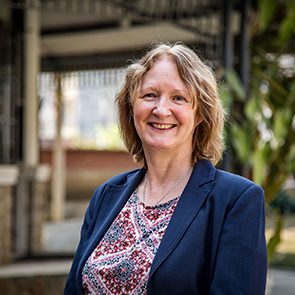

Dr. Miriam Jackson is a Senior Cryosphere Specialist in Managing Cryosphere and Water Risks and has been leading ICIMOD’s cryosphere work since joining the institution in 2020. She has vast experience in the cryosphere area, including field research in Norway, Bhutan, Antarctica, Nepal, Greenland, and India.
Miriam has worked extensively on the issues that society faces due to cryosphere changes; this has involved collaborating with hydropower companies on the risks of glacial lake outburst floods (GLOFs) and developing guidelines for climate-resilient hydropower development. She has also been involved in community interactions at the local level to share knowledge concerning the implications of cryosphere change. Besides, she is associated with international initiatives such as the Ambition on Melting Ice. Miriam is also a member of the Scientific Steering Group for WCRP’s Climate and Cryosphere Initiative.
Her important scientific publications include being the lead author for the IPCC on the High Mountain Areas chapter in the IPCC Special Report on Oceans and Cryosphere in a Changing Climate. She is also an editor of the recent HI-WISE report – Water, Ice, Society, and Ecosystems in the Hindu Kush Himalaya: An Outlook.
Before joining ICIMOD, Miriam worked as a glaciologist for the Norwegian government for over twenty years and her responsibilities included leading glacier research in the Svartisen Subglacial Laboratory under 200 m of ice and leading the Norway-India collaborative project, INDICE, which is studying the response of the Indian hydrological system to climate change.
Miriam holds a PhD in geophysics from the California Institute of Technology, an MS in geosciences from the Ohio State University (USA), and a BSc (Hons) in mathematics and astronomy from the University College London.
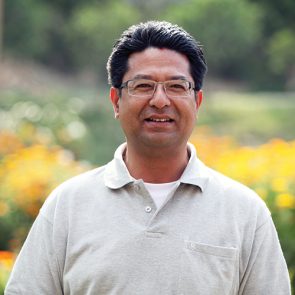

As a senior climate change specialist, Arun leads projects on climate projection and scenario development across various sectors and applies them to impact assessment.

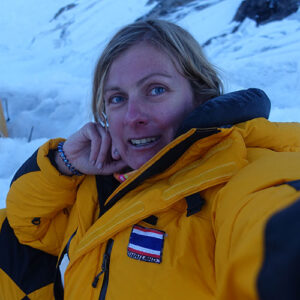
Climate diplomat | Ultra endurance athlete Japan, France, UK Carole is a French professional mountain athlete based in Japan who has climbed 8000 peaks in the Himalayas including Everest. Passionate about all things running and endurance, she has set course records in multiple key ultra-trail races in Asia. Each expedition to the world’s highest glaciers has opened her eyes to the consequences of cryosphere loss for local populations and the planet. After working in the renewable energy sector for six years she is now a climate diplomat for the UK government in Japan.
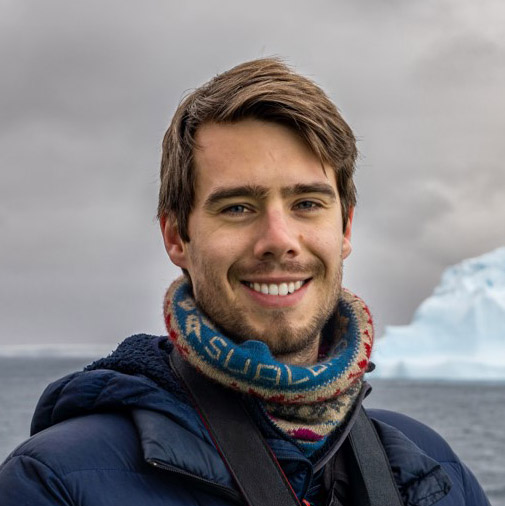

James is a glaciologist and climate scientist with a PhD and MPhil in Antarctic climate science from the University of Cambridge and the British Antarctic survey. Field work includes expeditions to Thwaites Glacier, one of the most rapidly changing and unstable glaciers in the world, and he previously worked as a snow scientist at ICIMOD. James works at the International Cryosphere Climate Initiative where he serves as the Chief Science Advisor and coordinates the Ambition on Melting Ice High-level Group on Sea-level Rise and Mountain Water Resources.
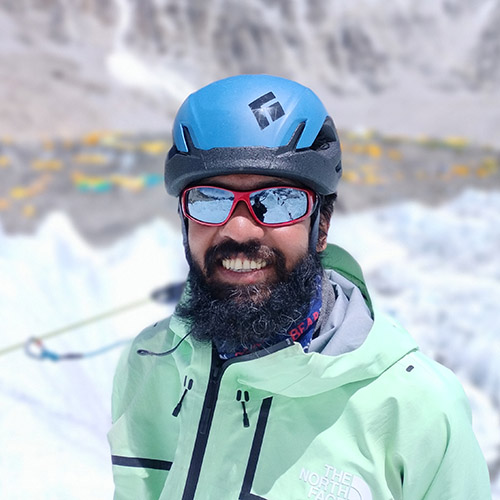
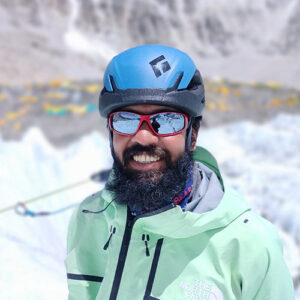
Babar is a doctor-turned-mountaineer, climate advocate, photographer and writer born in Chattogram, Bangladesh. Since first visiting the Himalayas in 2014 he has scaled multiple 6,000-metre mountains, and was the first Bangladeshi to climb Amadablam, in 2022. In 2024 he climbed Everest and Lhotse. He is the founder of mountaineering club Chattogram, Vertical Dreamers. In 2019 he hiked through all 64 districts of Bangladesh in 64 days raising awareness of single use plastics, and regularly coordinates environmental clean-ups. In 2023, he cycled 4,000 kilometers from the northernmost point of India to Kanyakumari in the South.


Nyal is a filmmaker and photographer, and director of the documentary, “When the Floods Come”, on the 2022 Pakistan floods. A wildlife filmmaking graduate of Bristol’s University of West England, Nyal has recently moved to Islamabad to launch his own production studio, Jungli Films. He has worked as a camera operator and editor with WWF-Pakistan, and as a researcher and drone operator for the BBC's landmark series, Planet Earth 3, and is a National Geographic grant recipient. With an educational background in environmental science and South Asian studies, Nyal has for several years focussed on telling stories of Pakistan's natural diversity and environmental challenges. He has worked as a camera operator and editor with WWF-Pakistan, WWF International's 'Big Cats Initiative', and as a researcher and drone operator for the BBC's landmark series, Planet Earth 3. He has also received a National Geographic grant to cover the stories of Afghan refugees arriving to Pakistan after the Taliban takeover in 2021.
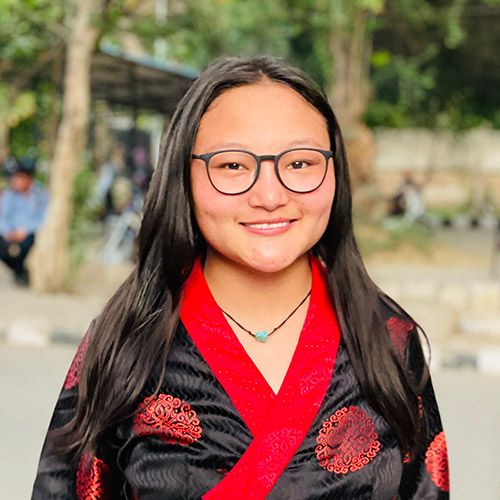
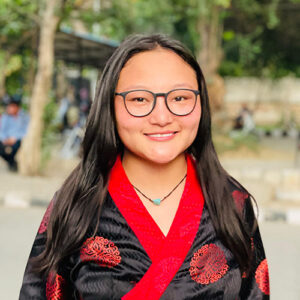
Tashi is a climate justice activist, human rights defender, and filmmaker from Limi Valley, Humla district in the far-west of Nepal. She uses storytelling to disseminate climate information and humanize nature. Her debut film, “No Monastery, No Village” (2024) addresses repercussions of climate change on culture heritage. As a grassroots green advocate, she focuses on decentralising and localising climate knowledge so that people on the margins can understand it too.


Tenzing Chogyal Sherpa is a cryosphere analyst at ICIMOD, whose work concentrates on understanding glacier dynamics in the Hindu Kush Himalaya region, the impacts of climate change on the region’s cryosphere and the human impacts due to those changes.
Born in Namche Bazaar, a village in the foothills of Mt. Everest, Tenzing is ethnic Sherpa and the grandson of the last surviving member of the 1953 British Mount Everest expedition team. He has extensive experience in conducting glacio-hydrological expeditions and geophysical surveys across Nepal. He was a key researcher in the National Geographic and Rolex Everest Expedition, contributing to the installation of one of the highest Automatic Weather Stations in the world. He also played a crucial role in the Everdrill project, where scientists drilled over 150 meters into the Khumbu Glacier.
A prominent advocate for climate action, Tenzing spearheaded ICIMOD’s global #SaveOurSnow campaign on the 70th anniversary of Everest's first ascent. He is a sought-after spokesperson on climate and cryosphere issues in the Hindu Kush Himalaya, with interviews featured by major global media outlets such as BBC World Service and The Times. In November 2023, at age 31, Tenzing represented ICIMOD at President Emmanuel Macron’s One Planet Polar Summit, the world's first summit dedicated to Earth's polar and glaciated regions.
He holds an MS by Research in Glaciology and a BSc in Environmental Science, both from Kathmandu University. Before joining ICIMOD, he worked as a Research Associate for the Cryosphere Monitoring Project (CMP) at Kathmandu University.
Some more information about Tenzing’s story can be found in the links below:
Video interviews/Documentary:
Audio Interview/Articles: